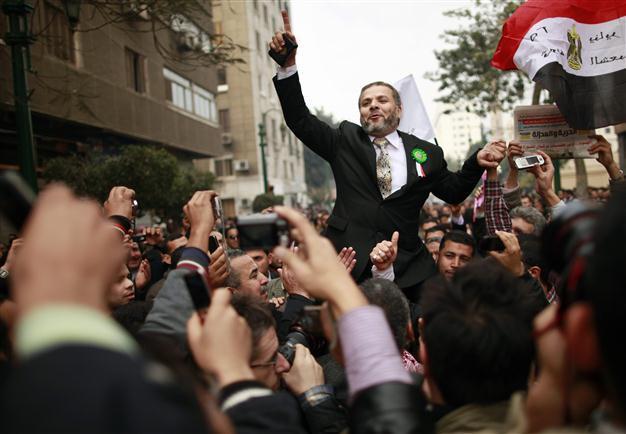Islamists take centre stage in Egypt parliament
CAIRO - Agence France-Presse

Muslim Brotherhood supporters celebrate outside Egypt's parliament in Cairo January 23, 2012. REUTERS Photo
Islamist MPs took centre stage on Monday as Egypt's parliament met for the first time since a popular uprising ousted Hosni Mubarak, while their supporters massed outside to cheer the historic event.A year after the uprising, many Egyptians see the new parliament as the first sign of democratic rule, in sharp contrast to the toothless legislature that existed under president Mubarak.
The 508-member assembly was dissolved in February by the Supreme Council of the Armed Forces that took power when Mubarak was forced to step down.
Egypt's first democratic parliamentary elections, held in phases between November and earlier this month, saw Islamists clinch nearly three-quarters of the seats.
The long-banned Muslim Brotherhood won a crushing victory with 47.18 percent through its political arm, the Freedom and Justice Party (FJP).
The ultra-conservative Salafist Al-Nur party came second with 24.29 percent, with the liberal Wafd party finishing a distant third.
The liberal Egyptian Bloc -- which includes the Free Egyptians party of telecoms magnate Naguib Sawiris who faces trial on allegations of insulting Islam -- came fourth with around seven percent.
The packed first session was chaired by parliament's most senior member, Mahmud al-Saqqa of the liberal Wafd party, ahead of a vote for parliament's speaker.
The FJP has nominated its secretary general Saad al-Katatni who is likely to be elected.
The Brotherhood, Egypt's best organised political grouping, had been widely expected to triumph in the polls but the surge by Al-Nur and high visibility of Salafi movements have raised fears about civil liberties and religious freedom.
The deputies were sworn in one by one, pledging to "preserve the safety of the nation and the interests of people and to respect the constitution and the law." In a sign of the Islamists' increasing assertiveness, one ultra-conservative Islamist MP insisted on adding a religious reference to the oath.
When lawyer Mamduh Ismail took the microphone vowing to also "abide by the law of God," he was sharply rebuked by the chair, Saqqa.
"Please stick to the text," an angry Saqqa urged Ismail, asking him to repeat the oath several times. "Mr Ismail, my friend, please stand up and read the oath, and stick to the text." Others tried to add "to protect the goals of the revolution" to the oath and received a similar rebuke, during the animated first session which saw several deputies don yellow sashes calling for "an end to military trials of civilians." Outside parliament, hundreds of Islamist supporters greeted deputies on their way in, in scenes unimaginable just a year ago when most Islamist movements were banned.
The exact role of parliament remains unclear, with power remaining in the hands of the generals who took power from Mubarak.
Elections for parliament's upper house, the Shura Council, are to begin later this month and end in February. Then the two chambers will choose a 100-member panel to draft a new constitution.
The SCAF has vowed to cede power to civilian rule by June when a new president is elected.
















